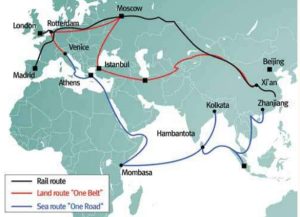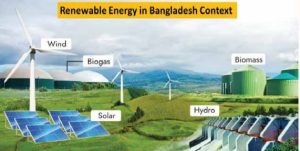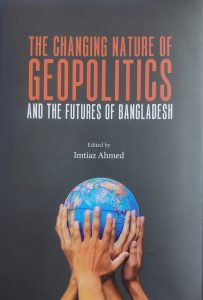—a book review*
Bangladesh’s pre-colonial, colonial, and pre-independent periods have many stories to tell as the country experienced the phase of prosperity from exploitation to freedom. This transformation in the region’s economy and social relations brought about the geopolitical reality of the area today. These historical transformations have shaped Bangladesh’s economic, social, and political fabric and active engagement in contemporary regional and international politics.
The Historical Context of Geopolitics
The historical development of the region’s geopolitics can be traced back to the pre-colonial, colonial, and pre-independence periods. The area was developed before the arrival of the colonial masters, and clothes from Bengal were in high demand worldwide, particularly in the textile sector. However, the arrival of British colonialism brought some significant changes to the economy and society. The systematic deindustrialization, which mainly targeted the muslin industry and exploitative economic policies, weakened the society and caused social suffering and disintegration. This period was characterized by transferring capital and resources from Bengal to Britain, which created an unjust social structure.

Since it was clear that the region would gain independence, there were risks from various forces within and outside the area. Internally, there were issues of economic subjection and political unrest between the poorer eastern part of Pakistan and the western developed part of Pakistan. This division became even more pronounced with the emergence of different forms of nationalism, including the Language Movement of 1952 and the Six-Point Movement of 1966, pinpointing the demands for self-rule and recognition of cultural diversity. Externally, the Cold War was the primary cause of geopolitical rivalry and conflict with allies and other regions, which made the struggle for independence more challenging. The military domination of (West) Pakistan and the Bangladesh Liberation War in 1971 were the main factors that led to the formation of Bangladesh.
Geopolitical Dynamics in Today’s World
Today, Bangladesh has transformed its image from being called a ‘bottomless basket’ to a role model for other South Asian countries. This is attributed to economic growth, social development, and policy measures of various kinds. Bangladesh has boosted its economy and development by focusing on textiles, remittances, and agriculture. Also, it has sustained high GDP growth for many years and demonstrated significant improvement in eradicating poverty, improving health, and increasing education. Due to the constant rise in economic power, Bangladesh also transformed into a norm setter in the geopolitics of knowledge in South Asia and beyond. Therefore, the country has shifted its profile to the innovation and education powerhouse premised on its cultural and intellectual endowment. This shift can be seen in how Bangladesh has engaged in international discourse on sustainable development, climate change, and cooperation in South Asia.

However, energy security remains a core concern for Bangladesh, which is shaped by South Asia’s regional dynamics. The regional energy situation and the country’s dependence on imported energy make it quite challenging. Achieving energy security means managing delicate relations with neighbors and global energy markets. These challenges are essential for Bangladesh to tackle and overcome in the long-term energy security plan, where the country has embarked on renewable energy and regional cooperation for energy imports. While trade benefits global economies, geopolitics poses challenges and opportunities for Bangladesh. The government has used this factor to improve the foreign relations in trade with our neighboring countries and other countries worldwide. However, political instabilities and export constraints present some problems hindering economic integration and trade liberalization.
Another challenge for Bangladesh is about water in South Asia. Since most of the country’s water resources consist of transboundary water, successful management of water resources requires cooperation with neighboring countries, especially India. Cooperation on water sharing and international relations is critical in managing water resources sustainably. Bangladesh’s active participation in regional water cooperation and its focus on the fair distribution of water demonstrates its sound strategy towards water-related issues and potentialities in collaboration. Bangladesh has come a long way from being one of the most economically vulnerable countries to being a development model.

Strategic Outlook: Bangladesh in the Global Geopolitical Arena
COVID-19 has presented Bangladesh with many difficult geopolitical realities to navigate. The pandemic has exacerbated the challenges already in place by disrupting supply chains and economic activities. Bangladesh’s measures propose not only to cope with the health problem but also to address the long-term consequences. They call for international assistance and improved regional cooperation. The new world culture of working from home and digitization presents opportunities and threats for Bangladesh, which must develop proper strategies to leverage the change to enhance economic power.
The two most essential strategies in Bangladesh’s foreign policy toward strategic directions are the Belt and Road Initiative (BRI) and the Indo-Pacific Economic Framework (IPEF). The BRI has presented itself as a credible funding source for infrastructure development to improve connectivity and economic integration with China and other countries. On the other hand, the IPEF, proposed by the United States where Biden’s administration wants to make the Indo-Pacific region free and open, is favorable for Bangladesh to balance two big powers. Given the China-US rivalry, this dual approach makes it possible for Bangladesh to have the advantage of attracting investments and economic growth owing to its strategic location.
 It is, therefore, clear that Bangladesh’s geopolitical future depends heavily on the nature of its relations with the external world and the internal capabilities of Bangladesh. Due to its economic importance and location, it has emerged as a regional political leader. However, internal environmental factors such as political stability and sustainable development must be considered to continue pushing it up. The bilateral relationship between Bangladesh and India, particularly in the contemporary world order of multipolarity, can be seen as potentially challenging but full of opportunities. The two neighboring countries have been in partnership and rivalry for a long time, evidenced by their interaction. Current irritants include sharing water resources, border killing, and imbalance in trade relations. For this reason, diplomatic ties and cooperation on critical issues can help foster regional stability and development.
It is, therefore, clear that Bangladesh’s geopolitical future depends heavily on the nature of its relations with the external world and the internal capabilities of Bangladesh. Due to its economic importance and location, it has emerged as a regional political leader. However, internal environmental factors such as political stability and sustainable development must be considered to continue pushing it up. The bilateral relationship between Bangladesh and India, particularly in the contemporary world order of multipolarity, can be seen as potentially challenging but full of opportunities. The two neighboring countries have been in partnership and rivalry for a long time, evidenced by their interaction. Current irritants include sharing water resources, border killing, and imbalance in trade relations. For this reason, diplomatic ties and cooperation on critical issues can help foster regional stability and development.
Bangladesh’s active participation in regional and international politics and economy and its policy to foster cooperation in energy, trade, and water resources also place it in a strategic position in South Asia’s future. Bangladesh is in constant motion within regional and global dynamics and has managed to maintain both internal stability and international relations.
Concluding Remarks
On December 6, 1971, just ten days before Bangladesh’s victory in the liberation war, a meeting was held in the White House situation room. Twenty-two officials from different branches of the U.S. Government attended a closed-door meeting, which Dr. Henry Kissinger, the National Security Advisor, chaired. The agenda discussed the possibility of famine in independent Bangladesh.

During the meeting, Mr. Maurice J. Williams, the deputy administrator of USAID, said, “By March 1972, Bangladesh will need all kinds of help.” In reply, Mr. Ural Alexis Johnson (a senior diplomat of the United States of America) said, “They’ll be an international basket.” Dr. Henry Kissinger quickly corrected Johnson, “But not necessarily our basket case.” Looking at Bangladesh from any position, one can see how wrong Mr. Johnson was. From an international basket case, now Bangladesh, under the bold and courageous leadership of the honorable Prime Minister Sheikh Hasina, is continuing to grow in various sectors, including economy, communication, industrialization, blue economy, renewable energy, and many others, and thereby competing with developing nations all around the world. Bangladesh, as a country with limited resources, has continued to fight against global warming, which is highly commendable. The information technology of Bangladesh has great potential and may become the backbone of our economy. Bangladesh is the 8th largest country in the world demographically, with a median age below 28. This pool of young people can add extra value to our overall GDP growth and foreign remittance earnings in the future.

Written by-
Mr. Fahd Bin Zahed
M.S. & B.S., (University of Houston, Texas, USA)
Core Faculty & Member of Center for Peace Studies (CPS)
North South University
*This is a book review of Imtiaz Ahmed ed. The Changing Nature of Geopolitics and the Futures of Bangladesh (Dhaka: Centre for Alternatives & Friedrich-Ebert-Stiftung, Bangladesh, 2024)


